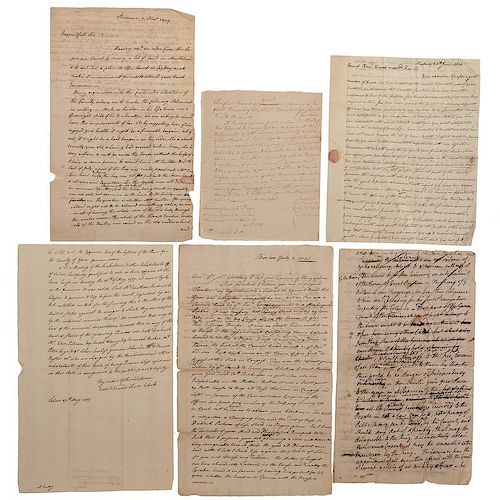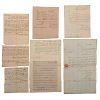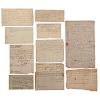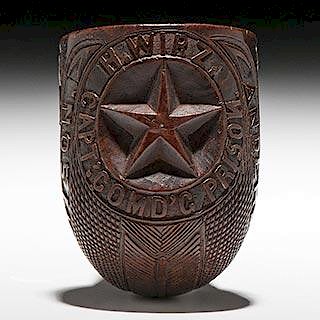Revolutionary War-Era Archive Related to Samuel Holten, Massachusetts Statesman & Delegate to the Continental Congress
About Seller
6270 Este Ave.
Cincinnati , OH 45232
United States
With offices in Cincinnati, Cleveland and Denver, Cowan’s holds over 40 auctions each year, with annual sales exceeding $16M. We reach buyers around the globe, and take pride in our reputation for integrity, customer service and great results. A full-service house, Cowan’s Auctions specializes in Am...Read more
Two ways to bid:
- Leave a max absentee bid and the platform will bid on your behalf up to your maximum bid during the live auction.
- Bid live during the auction and your bids will be submitted real-time to the auctioneer.
Bid Increments
| Price | Bid Increment |
|---|---|
| $0 | $25 |
| $500 | $50 |
| $1,000 | $100 |
| $2,000 | $250 |
| $5,000 | $500 |
| $10,000 | $1,000 |
| $20,000 | $2,500 |
| $50,000 | $5,000 |
| $100,000 | $10,000 |
About Auction
Feb 21, 2017 - Feb 22, 2017
Cowan's Auctions dawnie@cowans.com
- Lot Description
Collection of 23 papers related to Samuel Holten (1738-1816) spanning from 1751-1814, including: land deeds, requests to pay debts, notes to Holten concerning legal cases, receipts, documents signed and written by Holten, and more.
Physician by trade and politician by passion, Samuel Holten was a zealous Whig who dedicated his life to public service. He began his political career serving as a member of the Massachusetts Provincial Congress from 1774 to 1775 and the Massachusetts Committee of Safety in 1775. A curious portion of a document in the lot simply labeled A draft concerning grievances reads:
The King of Britain is our Sovereign, we bear true allegiance to him and are pleading for his just [illegible] expecting the colonies- That part of the government of the colonies, which of right belongs to the crown ought to be unrestrained and free from every their check but what arises from that share of the Government which our own Houses of Assembly hold of exercise by charter, and should be left to the free exercise of all that [illegible] granted to them by charter there would be no danger of Indepency on the crown. Our charter gives great Power to the crown in its Representative fully sufficient to alliance analogous to the [illegible] all the Liberty privileges reserved to the People--not alaw can pass not a penny of public money can be raised or disposed of by his consent, and should any act of assembly that may be disagreeable to the King accidentally obtain the Governor's consent it may be annuled in time three years by the King. The government has appointment of all executive officers with the Consult of council and solely all of the military officers. He has a negative upon the choice of counsellors, upon the speaker of the House and upon the few civil officers, that are chosen by both Houses, he has also the Power of cutting, prorogning(?) adjourning and dipardoning(?) the General Assembly. whosoever considers this powering all its branches given by our charter to the crown, will be far from thinking that out political [illegible] according to the charter, bears too much on the popular side; or that our fellow subjects in Great Britain can be in any danger of being injured by any acts of Government here, when their Sovereign who resides with them and whose predilection, if he may be summoned to have any, must be on their side, has such a check by his authority and so great an influence by his appointments upon the government of this Province. and there is so little reason from the construction of our charter to apprehend that the Democratic part of our Government will ever lie beyond its due bound. that even with all the favorable allowances to the People of which the [illegible] of the charter will bear, the danger seems to be on the other side and that their rights and privileges may by degrees be improved by the great power and indulgence on the other scale so ballance all this power and influence what is reserved to the people? The sale right of granting their own property and giving their consent to the laws by which they are to be governed--take away these, and the government expentially(?) differs from that of our fellow subjects in Great Britain and at once becomes despotic(?) after al that we have said upon these points we would be far from being understood to have in the law abated that just sense of Allegiance which we owe to the King of Great Britain our rightful sovereign.
The document is not in Holten’s hand. However, an annotation on the margin of the document appears to be written by him. His annotation suggests that another individual drafted the proposal and either sent or gave it to Holten to review. The draft of grievances was most likely produced for either the Massachusetts Provincial Congress, Massachusetts Committee of Safety, or at a local Town Meeting prior to the American Revolutionary War.
On May 20, 1774 the Parliament of Great Britain passed the Massachusetts Government Act and revoked the Massachusetts Charter of 1691. The 1691 Charter established English rule of the colony by appointing a governor, deputy governor and secretary, to be elected by members of the council. It rescinded many of its rights of self-government previously enjoyed by Massachusetts and Plymouth authorities by moving power from elected officials to royally appointed governors. By annulling the charter, the crown reduced Boston to a crown colony, installing a military government and forbidding unapproved town meetings. The charter mentioned in the document is most likely the Massachusetts Charter of 1691. Unable to tolerate the oppression from the crown, Massachusetts men organized the Massachusetts Provincial Congress to discuss whether or not they should rebel. Headed by its President John Hancock, it began meeting in secret on October 7, 1774. It organized a de facto government of Massachusetts outside of Boston and assumed all powers to rule including: collecting taxes, buying supplies, and raising a militia; making it the first of two autonomous governments of the Thirteen Colonies. Other members of the body included Paul Revere, Samuel Adams, and Samuel Holten. Prior to the first meeting, on October 4, 1774, the people of Worcester elected Thomas Bigelow as their representative for the Provincial Congress. Frustrated by British rule, they instructed if the charter was not reinstated to tell the Congress “to raise from the dissolution of the old constitution, as from the ashes of the Phoenix, a new form, wherein all officers shall be dependent on the suffrages of the people” (Albert Lovell, Worcester in the War of the Revolution: Embracing the Acts of the Town from 1765 to 1783, 1864, p. 48). Contrary to the strong language used by the people of Worcester, the draft in the lot uses language similar to the Olive Branch Petition, which demanded more independence from the crown, but did not call for complete separation. It is also likely that the people in Holten’s area remained somewhat loyal to the crown; therefore, Holten and another delegate drafted this response that was more representative of their province for the same meeting Bigelow attended at Concord. Based on the more favorable language in the draft, and the use of the word “indepency” instead of “independent,” it is possible that the draft in the lot is an earlier document created prior to the October 1774 for the Massachusetts Provincial Congress or composed at a Town Meeting in Danvers, but this cannot be entirely confirmed.
Early documents recording the first sessions of the Congress were dispersed and lost to history, although other letters and documents related to the meetings resurfaced later including some documents concerning the militia and munitions from the Congress (The Journals of Each Provincial Congress of Massachusetts in 1774 and 1775, and of the Committee of Safety…, 1884, ii). Those documents are similar to a second document in this collection that records an account of guns supplied to the town of Danover and drawed pay out of the treasury. The account has no date, but most likely dates from the American Revolution while Holten served as a major in the Massachusetts militia in the First Essex County Regiment or in 1775 while he served on the Congress that controlled the militias of rebellious regions.
Holten acted as a representative for Massachusetts for the Continental Congress from 1778-1780, 1783-1785, and 1787. During his terms, he signed the Articles of Confederation and acted as its president pro tempore in August 1785. He held many other important political positions at the state level. On May 27, 1796 the first Massachusetts Secretary of the Commonwealth, John Avery Jr., wrote to him, Agreeable to the directions of the two branches of the Legislature I have to inform your Honor that you have been elected by them a Counsellor to advise the Governor in the executive part of Government the ensuing year (Boston, May 27, 1796). That same year, he was elected judge in Essex County Probate Court. He kept that position until old age forced him to resign. Shortly before his retirement, John Asgood wrote him a very sincere letter tinged with sadness:
Your valuable life for a great number of years has been devoted to the public, and private good of your country, particularly this country, few men have had more the confidence and love of the people, few men deservedly had more honors conferred on them, few men served the people in so many different offices as your Honor, and scarcely any one man to be found that has given such satisfaction as you have done in every public station you have been intrusted with, which I think must give you great satisfaction now in the evening of your life....I take the freedom as on of your much esteemed friends to suggest to your honor consideration your resigning the office of Judge of Probate, which you have long discharged with such great satisfaction to the people of this county...I write from pure benevolent notions towards your Honor that your Hons unblemished character may not receive a stain in your advanced years (Newbury, June 24, 1814).
Holten consented and left the bench in 1815. He died at the beginning of the next year, January 2, 1816, at the age of 77.
The remaining documents in the lot relate to Holten's long life of public service and personal life. It includes: copy of an extract from Danvers town records concerning Enoch Putnam and a possible land dispute, dated April 8, 1771; 1761 petition granting Samuel Holten to be the executor of David Putnamjum's(?) estate in Danvers; receipt confirming the purchase of a horse signed by G. Osborn, Collector of Revenue, in Salem on September 19, 1801; bill of sale for at least one young cow dated June 1806; letter from Samuel Putnam to Holten, dated May 19, 1801; copy of a letter to Dr. Webster dated August 17, 1795; letter from John Woodside transferring the certificates and warrants for an Ishmael Bowers, March 8, 1794; letter from Edward Putnam dated November 9, 1809; 1772 letter concerning the First Church of Christ in Danvers; letter from William Lake Webster dated February 2, 1794; July 3, 1783 letter from Aaron Wood; 1751 receipt; receipt for medicine in 1802; note from Samuel Putnam concerning a land dispute; an invitation to dine at Mr. and Mrs. Wadsworth's home possibly received on September 6, 1792; receipt from D. Putnam dated April 9, 1781; copy of a letter sent to Colonel Meigs dated February 12, 1795; an invitation to dine with William Vans dated August 9, 1784; 1773/93(?) letter from William Vans requesting Holten's assistance; and a curious 1777 copy of the proceedings of town of Salem regarding inimical persons, which is worthy of further research.
___________________________________________________________________________________________________
Other Sources:
https://archive.org/stream/worcesterinwarof00love#page/48/mode/2up
https://allthingsliberty.com/2013/02/americas-first-declaration-of-independence/
https://www.britannica.com/event/Intolerable-Acts#ref27342
http://bioguide.congress.gov/scripts/biodisplay.pl?index=H000750
Provenance: N. Flayderman and Co., Inc.Range in condition, most have folds and toning but the ink remains dark and legible. There are some brittle folds and edges on some of the documents.Condition
- Shipping Info
-
SHIPPING. At the request of the buyer, Cowan's will authorize the shipment of purchased items. Shipments usually occur within two weeks after payment has been received. Shipment is generally made via UPS Ground service. Unless buyer gives special instructions, the shipping method shall be at the sole discretion of Cowan's Auctions, Inc.. Cowan's is in no way responsible for the acts or omissions of independent handlers, packers or shippers of purchased items or for any loss, damage or delay from the packing or shipping of any property.
-
- Buyer's Premium



 EUR
EUR CAD
CAD AUD
AUD GBP
GBP MXN
MXN HKD
HKD CNY
CNY MYR
MYR SEK
SEK SGD
SGD CHF
CHF THB
THB













